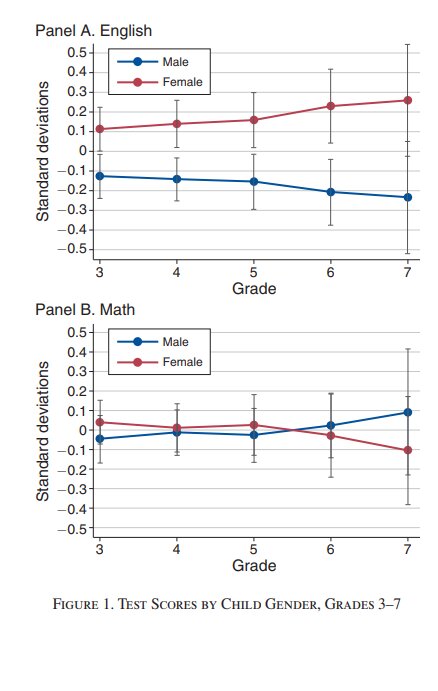For most of us, when we make major career choices, we tend to lean into what we’re good at. According to new findings from the University of California San Diego’s Rady School of Management, such skills may develop early in childhood and there can be significant differences depending on gender.
Researchers have long observed that fewer women than men study and work in the fields of science, technology, engineering and math (STEM). Now, it appears that women may self-select out of these fields partly as a result of receiving more early-childhood reinforcement in language arts, according to a new paper to be published in the journal American Economic Review Papers and Proceedings.
“We find girls are better in English than boys in grades three through seven,” said Anya Samek, an associate professor of economics at the Rady School and one of the study’s co-authors. “Because girls are more likely to do well in language fields early in life, they may find themselves more inclined to choose them for majors and careers. Thus, women may be underrepresented in STEM in part because of their cultivated talents achieved earlier in life.”
The findings are based on a longitudinal study in which the researchers examined time parents spend with their children from ages three to five alongside the children’s test scores when they were ages eight to 14.
The researchers also find more time parents spent teaching to children from ages three to five (up to three hours or more a week) correlated with better test scores when the children are ages eight to 14. For instance, teaching three or more hours predicted 6 percent higher scores in English for children in fourth grade, relative to teaching one hour or less.
However, there’s a gender gap in parental investment in the children from ages three to five. On average, parents spent more time with girls and several factors could contribute to this disparity. For example, compared to boys, the researchers found girls had a stronger ability to sit still and focus and parents of girls were also 18 percent more likely to report that their child liked it when they taught.
The study participants are mostly from Chicago and include 2,185 children and 953 parents who responded to surveys, 702 of whom also provided test-score data.
Girls did substantially better in language-related studies than boys, while scores for girls and boys in mathematics were more similar. They found a stronger correlation between parental investment with language scores than they did with math.
“I think it’s surprising to see that parental investments are correlated with the test scores in English but not in math,” said Samek. “It could be because we’re told to read to our kids at least 10 minutes a day. We’re told to introduce them to books and I think we probably spend less time thinking about how to engage children in math.”
Samek added, “We show that early-life investments by parents are strongly associated with later-life language skills but only weakly associated with later life math skills. It could be that parents just do not spend as much time teaching children math as they do reading. If that is the case, the next step may be to encourage parents to teach their young children math alongside reading.”
More information: Amanda Chuan et al, Parental Investments in Early Childhood and the Gender Gap in Math and Literacy, AEA Papers and Proceedings (2022). DOI: 10.1257/pandp.20221036
Citation: Girls excel in language arts early, which may explain the STEM gender gap in adults (2022, April 19) retrieved 19 April 2022 from https://phys.org/news/2022-04-girls-excel-language-arts-early.html



Having noticed systemic issues in education systems since my very first contact with them as a child, I would not be surprised if flaws in how education is performed are ultimately responsible for the differences rather than biology.
How do you explain that almost every society/culture on Earth more or less flaw’ed in the same way? It’s either a gigantic coincidence or there are biological root causes behind it.
I wish there was some way to actually test this things. It is impractical to make a research that lasts for decades, starting from childhood until 25 or something.
There are well known research in gender studies / psychology about for example the cliché that girls are less good for math than boys which is of course complete bullshit.
You don’t need to wait 25 years to study that.
Speaking of systemic teaching issues, the only thing worse than math is physics.
I was able to do calculus at 10 yrs old (the reason I know that is kind of a long story), yet even at 20 years old I struggled to understand how it was taught.
Physics is worse because everything is always taught as an aprocryphal story about who discovered it and how. And then hand-waved away with math whenever questions arise.
Physics is tough, even crazier is the fact physics is labeled as the simplest science. This is due to physics only interpreting length, mass, time, and electric current. This claim is very misleading in my mind. Calculus was developed as a necessity to interpreted these four qualities to help better understand the world around us. But I couldn’t agree more regarding physics needing a full makeover to make the subject more approachable for sure.
Removed by mod
I came here to say this and i downvoted the article, not because the actual findings are wrong, but the interpretation is fucked up. “we tend to lean into what we’re good at” i don’t think is true
it’s not that girl brains are hard wired for specific tasks, but: